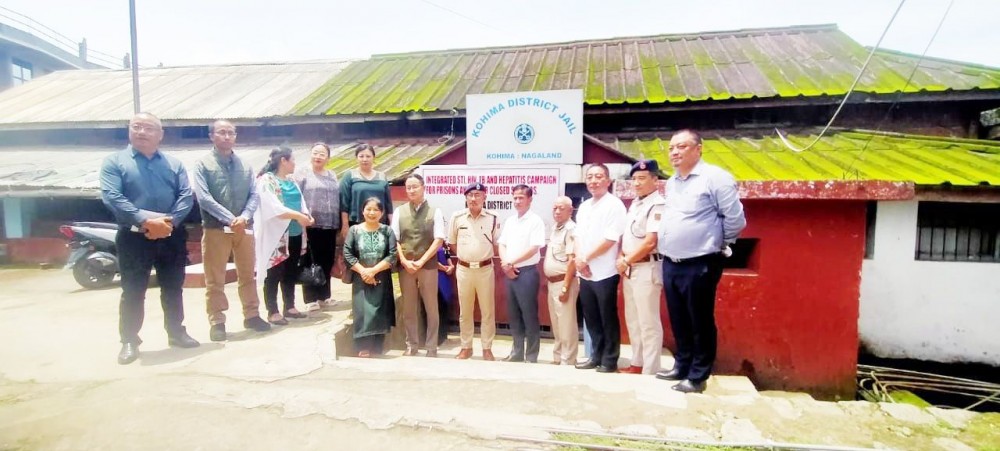Caption: Director General of Prisons, Renchamo P Kikon and others during the State launching programme of Integrated STI, HIV, TB, Hepatitis Campaign in prisons and other closed settings in Kohima in July 20. (Morung Photo)

Morung Express news
Kohima | July 20
In a concerning statement, the Nagaland State AIDS Control Society (NSACS) revealed that Nagaland prisons has the 3rd highest number of HIV prevalence among inmates in the country at 4.6% after Punjab and Mizoram.
This data emerged after surveys were conducted in Dimapur central jail on 2019 and 2021 using a national standardised surveillance method. The 1st survey of the prevalence was 4.6% and the 2nd was 4.57%.
Going by the statistics in the Nagaland prisons, the spread of HIV is quite alarming, Director General of Prisons, Renchamo P Kikon remarked while addressing the State launching programme of Integrated STI, HIV, TB, Hepatitis (ISHTH) Campaign in prisons and other closed settings (P&OCS) in Kohima today.
On this, he implied that main causes of high HIV prevalence maybe due to intravenous (IV) drug abuse and sexual orientation of the inmates in the prisons.
Towards this, he called for a holistic and synergetic approach to tackle HIV.
HIV prevalence-prohibition linkages
Kikon also said the three states with the highest number of prevalence -Punjab, Mizoram, and Nagaland coincidentally have prohibition in place.
He, therefore, wondered whether there is a correlation in driving more people towards drug abuse which in turn leads to higher rate of prevalence of HIV. There is a need to undertake more research and case studies in this aspect, the DC added.
Even though inmates are treated and rehabilitated in the best possible manners in prisons as a reformative institute to bring sustainable changes in their life after prison, Kikon pointed out that there was need to look at how the initiative can be sustained.
He maintained that time bound campaign alone cannot bring significant changes in these closed setting which not only include prisons but other rehabilitation centres and homes.
But to sustain these programmes, the department was not equipped starting from lack of healthcare providers, the DG lamented adding that there are only pharmacists in 5 jails across the state.
Need to segregate statistics of UTPs & convicts for correct TI
Further, Kikon underscored that apart from keeping records of statistics, it was important and necessary to segregate Under Trial Prisoners (UTPs) and Convicts for a concerted outcome and for making correct Targeted Intervention (TI).
In Nagaland, about 17% (117) out of 673 prisoners, as per the statistics, were convicts and the rest 80% were UTPs.
While, the UTPs may stay and leave the jail institution after their trial period, Kikon asserted that those who have HIV infection need to be made aware and responsible.
"If we are only focusing on the UTPs today and they leave the jail tomorrow, we will not be able to address the fundamental issue. As far as the convicts were concerned, it is easier for us to have the targeted intervention."
Dr Bernice D Thapru, Jt. Director (Prevention), NSACS said the national campaign have been necessitated because of the HIV prevalence observed in prison settings.
During the campaign, Dr Thapru informed that comprehensive health camps will be carried out which include basic testing with medical teams in addition to general health check up. Testing for HIV, STI, hepatitis, TB among others will be done and those testing positive would be given treatment.
Post the campaign, the NITI AAYOG will be evaluating the reports. However, the privacy of inmates will be maintained.
The launching programme today was jointly organised by Department of Prisons, Department of Social Welfare and Nagaland State AIDS Control (NACO) society. A formal launching of the health camp was also held at District Jail, Kohima after the programme.






